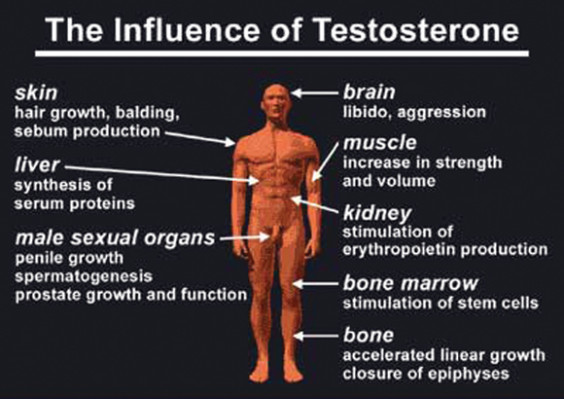What Is ‘Low T?’ Pros and Cons of Testosterone Rx
By Dr. Mark Pinsky // March 16, 2015
more common than most people realize


Low T is not just an issue for seniors. Plenty of younger men develop low testosterone.
Decreased testosterone or “Low T,” as it is sometimes called, is more common than most people realize.
Those who recognize that this is a serious medical condition often believe that testosterone’s sole function is to raise our libido.
While testosterone does in fact do this, a lack of it has also has been linked to cardiovascular disease, Type 2 Diabetes and morbid obesity.
Although the exact mechanism of how this occurs has been debated, as of now, there is no universally accepted explanation.
Fatigue May Be The Culprit
One theory that makes the most sense to me is that low testosterone creates extreme fatigue. This fatigue results from a decreased production of red blood cells which decreases the amount of oxygen available for the body to use.
 The resultant inability to then exercise effectively goes down resulting in abdominal fat deposition, better known as the “muffin top.” This increased peripheral fat is what I believe creates a large percentage of the cases of Diabetes and heart disease.
The resultant inability to then exercise effectively goes down resulting in abdominal fat deposition, better known as the “muffin top.” This increased peripheral fat is what I believe creates a large percentage of the cases of Diabetes and heart disease.
So, is it possible that the opposite occurs? Yes! People, who develop chronic diseases such as Type 2 DM and heart disease, develop low T by a mechanism not clearly understood.
The important point here is that if you have chronic disease, you are likely fatigued, and won’t know if low T is contributing unless you have your testosterone levels checked by a simple blood test.
In fact, I would argue, that all men 70 and over should have their testosterone checked if they are experiencing fatigue and or muscle weakness.
Low T Affects Bone, Muscle Strength
Testosterone levels decline sharply after age 70 in many senior men affecting both bone and muscle strength. One of my greatest concerns for my senior men is their ability to maintain independent living.

To do this, muscle and bone strength (especially the thigh muscles) must be preserved. So in addition to checking their testosterone, I believe that men 70 and over should have a DEXA scan which evaluates the density of their bones.
While we think of osteoporosis as a female only disease, this is emphatically incorrect and can be very debilitating for men as well.
Not Just A Senior Problem
Low T is not just an issue for seniors. Plenty of younger men (even in their 30s) develop low testosterone.
The causes vary, but there are three common reasons this occurs:
Some men, undergo premature testicular failure, meaning their testicles just stop producing testosterone for no apparent reason (women have the same phenomenon known as premature ovarian failure).
(1) Some men, undergo premature testicular failure, meaning their testicles just stop producing testosterone for no apparent reason (women have the same phenomenon known as premature ovarian failure).
(2) In some cases, testicular failure results from long-term use or abuse of narcotics.
(3) Others develop testicular failure from the inappropriate use of testosterone or testosterone like products when they were in their teens or early 20s.
Please keep in mind that this article addresses the appropriate physiologic replacement of testosterone. I’m not discussing giving people anabolic doses of testosterone to create a desired physical appearance.
Pros, Cons of Testosterone Rx
If a true testosterone deficiency is established, before deciding whether to undergo testosterone replacement therapy, it is imperative to have a good understanding of the pros and cons.

The major pros of energy, strength and increased libido have already been addressed.
The cons include the rare possibility of male breast enlargement (gynecomastia), increased acne, increased prostate size, abnormal liver functions, thickening of blood, which could result in clot risk such as heart attack and stroke and sterilization (inability to have children).
However, it has been well documented that no link exists between giving testosterone and the development of prostate cancer.
The potential cons are worrisome, but my 18 years of experience parallels what clinical trials have reported: the incidence of side effects is very rare if monitored closely.
I have all my patients do bloodwork every 2-3 months depending upon how long they have been in therapy.
The non-fasting bloodwork consists of hemoglobin and hematocrit, liver function tests, PSA and total testosterone.
Clear Physician-Patient Communication Key
Communication between the doctor and patient as well as respect for this medication is vital to the patient’s success, which is constant with how I believe all medicine should be practiced.
For more information call Dr. Pinsky at 321-255-2289 or log on to MDVIP.com/MarkPinskyDO
ABOUT DR. MARK PINSKY
 Dr. Mark Pinsky is an affiliate of MDVIP and is board certified in family medicine by the American Academy of Family Medicine. He completed his doctorate degree from the University of Health Sciences College of Osteopathic Medicine in Kansas City, Missouri.
Dr. Mark Pinsky is an affiliate of MDVIP and is board certified in family medicine by the American Academy of Family Medicine. He completed his doctorate degree from the University of Health Sciences College of Osteopathic Medicine in Kansas City, Missouri.
His family practice residency was served at the University of Louisville in Kentucky. In addition, Dr. Pinsky completed a sports medicine fellowship in Cleveland, Ohio, with Lutheran Medical Center in conjunction with Horizon Orthopedics, the team physicians for the Cleveland Indians.
He also has a certificate of additional qualifications in sports medicine from the American Academy of Family Practice. Dr. Pinsky speaks nationally for several pharmaceutical companies and serves as the medical director for a home health care agency. Currently he is caring for Viera High athletes and is a partner of Medical Associates of Brevard. To reach Dr. Pinsky, call 321-255-2289.














